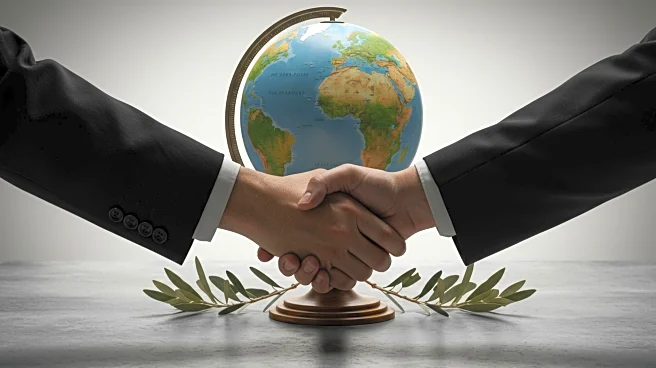What's Happening?
European Union leaders are pressing President Trump to advocate for Ukraine's territorial integrity during his upcoming discussions with Russian President Vladimir Putin. The EU has emphasized the importance of an unconditional ceasefire and robust security guarantees before any concessions are made. This stance reflects Europe's growing assertiveness in the geopolitical landscape, as it now provides more military and financial aid to Ukraine than the United States. Despite President Trump's indication that Ukraine might need to cede some territory to Russia, he has expressed a desire to reclaim some of the occupied land for Ukraine. The EU's position is supported by leaders from Germany, France, Poland, Finland, and the United Kingdom, who have collectively warned against any peace deal that compromises Ukraine's territorial integrity.
Why It's Important?
The EU's firm stance on Ukraine's territorial integrity highlights a significant shift in the balance of influence between Europe and the United States regarding the conflict. Europe's increased military and financial support for Ukraine underscores its commitment to the region's stability and its willingness to challenge U.S. foreign policy under President Trump. This development could lead to a realignment of geopolitical alliances, with Europe taking a more prominent role in shaping the outcome of the Ukraine conflict. The potential land concessions discussed by President Trump and his negotiators could have far-reaching implications for Ukraine's sovereignty and the broader international order.
What's Next?
As President Trump prepares for talks with President Putin, the EU is likely to continue exerting pressure to ensure that any peace agreement respects Ukraine's territorial integrity. The EU's commitment to supporting Ukraine financially and advancing its bid to join the EU suggests ongoing diplomatic efforts to strengthen Ukraine's position. The outcome of the Trump-Putin discussions could influence future U.S.-EU relations and the geopolitical dynamics surrounding the Ukraine conflict. Stakeholders, including political leaders and civil society groups, will be closely monitoring the situation for any shifts in policy or strategy.
Beyond the Headlines
The EU's proactive approach in the Ukraine conflict may signal a broader trend of European nations asserting their influence in global affairs, potentially leading to a more multipolar world order. This shift could have long-term implications for international diplomacy, security arrangements, and economic partnerships. The ethical considerations surrounding territorial concessions and the protection of national sovereignty are likely to be debated extensively, influencing public opinion and policy decisions.









